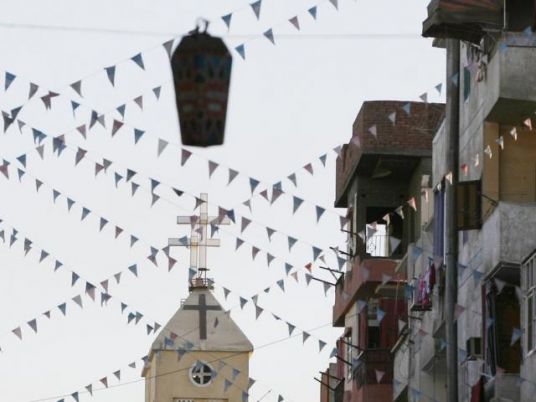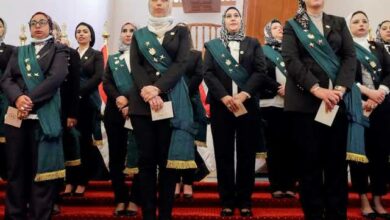State-owned papers lead with reports of yesterday’s ceremony by the Ministry of Awqaf (Religious Endowments) commemorating Prophet Mohamed’s birthday. In a speech addressed to both “Arab and Islamic nations,” President Mubarak called on religious leaders, intellectuals and members of civil society, to “do their part” in asserting the values of citizenship, and promoting positive beliefs and practices.
Al-Ahram quotes the president saying that “the efforts of scientists and followers of the faith are an indispensable asset in this Islamic nation’s progress, as are its philosophers, writers, educators, and cultural and educational institutions.”
President Mubarak went on to praise those efforts as the most efficient way to spread the essence of Islam, which, with its teachings and principles, will “preserve our society, strengthen the bonds between us, and protect us from the dangers of division, extremism, and sectarian provocation.”
Beside coverage of the president’s speech, Al-Akhbar’s front page includes an update on the controversy within the State Council over the barring of female judges. The paper reports on Sharqiya Governor and State Counselor Yehia Abdel Maguid Hafez’s visit to the council yesterday, during which he met with both supporters and opponents of a motion granting women the right to serve as judges in the Judicial Administrative court.
Infuriated by the rejection of motion last week, female members of the People’s Assembly reportedly vocalized their protests to the council, saying that “Egypt’s first ruler was a woman,” and adding that “Islam preaches equality.” In response, People’s Assembly Speaker Fathi Sorour asserted that the female MPs’ comments do not “interfere in state affairs,” and he affirmed they have right to express themselves freely in parliament, which he called the “fortress of liberty.”
Al-Akhbar also reports on an agreement to conduct a state-sponsored investigation into several MP’s alleged misuse of government funds for personal “medical expenses.” The investigation will begin soon, pending its approval by a majority vote in parliament. Final decisions were also reached regarding organ trafficking, with new measures making organ transplants between Egyptians and foreigners illegal. Other procedures outlawed by the parliamentary vote include the artificial growth of reproductive organs, as well as organ transplants from children.
While it was a minor story in Al-Akhbar, the Administrative High Court’s ruling that Egypt will continue exporting natural gas to Israel made headlines in the independent press, with Al-Wafd calling the decision a “shock to Egyptians’ emotions.” The High Court defended its position by claiming it “falls in line with Egyptian national security considerations.” Al-Shorouq says the courts further elaborated on their decision, citing the Camp David agreement between the two nations, which places Israel in a position "the same as any other nation” in terms of its trade relations with Egypt. Representatives of the High Court added that “the Egyptian people have first priority when it comes to their treasured resources, and the importing of any materials or goods will come to an immediate stop if the demands of the Egyptian people [for those materials and goods] are not first met.”
Al-Shorouq profiles Israeli Defense Minister Ehud Barak, citing the “dramatic transformation” he was witnessed in the Arab world over the past forty years. Speaking at a ceremony in Washington commemorating military analyst Ze’ev Schiff, the Israeli politician claimed Arab nations are now “racing” among themselves to see who can first come up with an effective Arab-Israeli peace plan that would be recognized by the rest of the region.
“Israel is in the Middle East–North America and Canada are not our neighbors. This is a tough region, where there is no mercy for the weak, and no second chances for those who cannot defend themselves,” Barak said, according to Al-Shorouq. Barak also reminded attendees that there would be no achievable peace unless other states realize that “Israel cannot be defeated, not militarily, and not through extortion…and Israel is not politically naïve to the extent that it can be deceived.”
In Al-Dostour the above stories take a back seat to the continuing coverage of Mohamed ElBaradei, who is quoted in headlines stating: “Change is inevitable.” In an interview with the Associated Press, the former director of the United Nations International Atomic Energy Agency expressed his fear of a revolution if the government fails to respond to its people’s demands for change.
ElBaradei also stated a desire to see the formation of a peaceful people’s movement for free and fair presidential elections, adding that the government’s participation in instigating change would ensure that Egypt would soon find itself in “the best condition.” When asked by the AP if he believes that the current regime may come under the same revolutionary pressure as the Iranian regime after last June’s controversial presidential elections, ElBaradei replied, “I hope it doesn’t come to that and that we can avoid a similar situation, but in the end it all comes down to the ruling powers.”
Egypt’s newspapers:
Al-Ahram: Daily, state-run, largest distribution in Egypt
Al-Akhbar: Daily, state-run, second to Al-Ahram in institutional size
Al-Gomhorriya: Daily, state-run
Rose el-Youssef: Daily, state-run, close to the National Democratic Party’s Policies Secretariat
Al-Dostour: Daily, privately owned
Al-Shorouq: Daily, privately owned
Al-Wafd: Daily, published by the liberal Wafd Party
Al-Arabi: Weekly, published by the Arab Nasserist party
Youm7: Weekly, privately owned
Sawt el-Umma: Weekly, privately owned




